New Hampshire/New England
dedicated to preserving, restoring and promoting the Mass according to the 1962 Roman Missal of Blessed John XXIII
Latin Mass Explained
Traditional Latin Tridentine Mass
of the
One Holy Catholic Apostolic Church
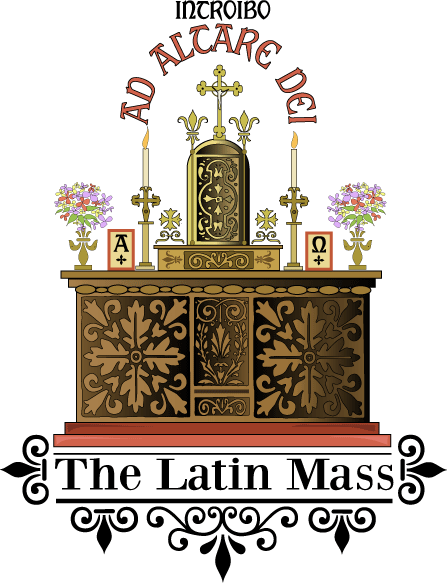
Traditional Latin Tridentine Mass
Introduction
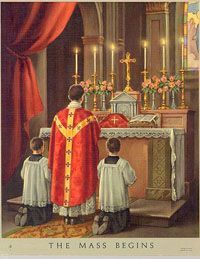
On Sundays before the principal Mass the church and congregation are sprinkled with holy water, in The Asperges.
After the sanctuary lights and altar candles are lit, the bell is rung and the priest approaches the altar. He carries the veiled chalice and the paten containing the unconsecrated host. He places the chalice on the center of the altar, and the Missal to the right (Epistle) side, with colored markers or ribbons pre-set to indicate the changeable sections for that day's Mass.
The priest makes the first sign of the cross, symbolizing that this Mass is to be offered in the name of The Father, and of the Son, and of the Holy Spirit. The sign of the cross will be repeated over 50 times through the course of the Mass.
Psalm 42 is sung during the Mass of the Catechumens (the first part of the Mass) who will mark their spiritual rebirth by being baptized on Easter Sunday.
Traditional Latin Tridentine Mass Asperges
| ORDO MISSAE | ORDINARY OF THE MASS |
| P. Asperges me | P. Thou shalt sprinkle me, |
| C. Domine, hyssopo, et mundabor: lavabis me, et super nivem dealbabor. Ps. 50 Miserere mei, Deus, secundum magnam misericordiam tuam. | C. Lord, with hyssop and I shall be cleansed; thou shalt wash me, and I shall be made whiter than snow. Have mercy on me, O. God, according to thy great mercy. |
| V. Gloria Patri, et Filio, et Spiritui Sancto, | V. Glory be to the Father and to the Son and to the Holy Spirit. |
| R. Sicut erat in principio, et nunc, et semper, et in saecula saeculorum. Amen | R. As it was in the beginning, is now, and ever shall be, world without end. Amen. |
| Antiphon: Asperges me, Domine, hyssopo, et mundabor: lavabis me, et super nivem dealbabor. | Antiphon: Thou shalt sprinkle me, Lord, with hyssop and I shall be cleansed; thou shalt wash me, and I shall be made whiter than snow. |
Traditional Latin Tridentine Mass Asperges During Easter Time
| ORDO MISSAE | ORDINARY OF THE MASS |
| P. Vidi aquam | P. I saw water coming |
| C. egredientem de templo, a latere dextro, alleluia: et omnes ad quos pervenit aqua ista salvi factci sunt, et dicent: Alleluia, alleluia. Ps. 117 Confitemini Domino, quoniam bonus; quoniam in saeculum misericordia ejus. | C. forth from the Temple from the right side, alleluia: and all those were saved to whom that water came, and they shall say alleluia, alleluia. Give praise to the Lord, for he is good,: for His mercy endureth forever. |
| V.Gloria Patri, et Filio, et Spiritui Sancto, | V. Glory be to the Father and to the Son and to the Holy Spirit. |
| R. Sicut erat in principio, et nunc, et semper, et in saecula saeculorum. Amen | R. As it was in the beginning, is now, and ever shall be, world without end. Amen. |
| Antiphon: Vidi aquam egredientem de templo, a latere dextro, alleluia: et omnes ad quos pervenit aqua ista salvi factci sunt, et dicent: Alleluia, alleluia | Antiphon: I saw water coming forth from the Temple from the right side, alleluia: and all those were saved to whom that water came, and they shall say alleluia, alleluia. |
| P. Ostende nobis, Domine, misericordiam tuam. (alleluia) | P. Show us, Lord, Your mercy. (Alleluia) |
| S. Et salutare tuum da nobis (alleluia) | S. And grant us Your salvation. (Alleluia) |
| P. Domine, exaudi orationem meam. | P. O Lord, hear my prayer. |
| S. Et clamor meus ad te veniat. | S. And let my cry come unto You. |
| P. Dominus vobiscum. | P. May the Lord be with you. |
| S. Et cum spiritu tuo. | S. And with your spirit |
| P. Exaudi nos, Domine, sanctae Pater, omnipotens aeterne Deus et mittere digneris sanctum Angelum tuum de caelis, qui custdiat, foveat, protegat, vistet, atque defendat omnes habitantes in hoc habitaculo. Per Christum Dominum nostrum. | P. Let us pray. Hear us Lord, holy Father, almighty and eternal God; and graciously send Your Holy Angel from heaven to watch over, to cherish, to protect, to abide with, and to defend all who dwell in this house. Through Christ our Lord. |
| S. Amen | S. Amen. |
Traditional Latin Tridentine Mass Begins
with Mass of the Catechumens
| ORDO MISSAE | ORDINARY OF THE MASS |
| P. In nomine Patris, et Filii, et Spiritus Sancti. | P. In the Name of the Father, and of the Son, + and of the Holy Spirit. |
| S. Amen. | S. Amen |
| P. Introibo ad altare Dei | P. I will go to the altar of God. |
| S Ad Deum qui laetificat juventutem meam. | S. To God, the joy of my youth. |
(Psalm 42 – Omit during Passiontide and Requiem Mass)
| ORDO MISSAE | ORDINARY OF THE MASS |
| P. Judica me, Deus, et discerne causam meam de gente non sancta: ab homine iniquo et doloso erue me. | P. Do me justice, O God, and fight my fight against an unholy people, rescue me from the wicked and deceitful man. |
| S. Quia tu es, Deus, fortitudo mea: quare me repulisti, et quare tristis incedo, dum affligit me inimicus? | S. For Thou, O God, art my strength, why hast Thou forsaken me? And why do I go about in sadness, while the enemy harasses me? |
| P. Emitte lucem tuam et veritatem tuam: ipsa me deduxerunt et adduxerunt in montem sanctum tuum, et in tabernacula tua. | P. Send forth Thy light and thy truth: for they have led me and brought me to thy holy hill and Thy dwelling place. |
| S. Et introibo ad altare Dei: ad Deum qui laetificat juventutem meam. | S. And I will go to the altar of god, to God, the joy of my youth. |
| P. Confitebor tibi in cithara, Deus, Deus meus quare tristis es anima mea, et quare conturbas me? | P. I shall yet praise Thee upon the harp, O God, my God. Why art thou sad, my soul, and why art thou downcast? |
| S. Spera in Deo, quoniam adhuc confitebor illi: salutare vultus mei, et Deus meus. | S. Trust in God, for I shall yet praise Him, my Savior, and my God. |
| P. Gloria Patri, et Filio, et Spiritui Sancto. | P. Glory be to the Father, and to the Son, and to the Holy Spirit. |
| S. Sicut erat in principio, et nunc, et semper: et in saecula saeculorum. Amen. | S. As it was in the beginning is now, and ever shall be, world without end. Amen. |
| P. Introibo ad altare Dei. | P. I will go to the altar of God. |
| S. Ad Deum qui laetificat juventutem meam. | S. To God, the joy of my youth. |
| P. Adjutorium nostrum in nomine Domini. | P. Our help + is in the Name of the Lord. |
| S. Qui fecit coelum et terram. | S. Who made heaven and earth. |
Traditional Latin Tridentine Mass Confiteor
As culpable sinners, none of us (including our priest) are worthy of the mercy of our Lord and Judge Jesus Christ. In humble adoration, we give thanks and express deep sorrow for all of our shortcomings, and we humbly ask Him to watch over and keep us, as our Father.
As Christians we know that for God there is little differentiation between this world and the next, and that the saints in Heaven and the souls in Purgatory exist within His creation just the same as we exist in His creation here on earth. We are therefore just as much in communion with them as we are with those remaining here with us on earth.
We humbly ask for their prayers for us, even as we pray for them and for each other.
The priest bows profoundly low and begins.
(Priest’s Confession)
| ORDO MISSAE | ORDINARY OF THE MASS |
| P. Confiteor Deo omnipotenti, beatae Mariae semper Virgini, beato Michaeli Archangelo, beato Joanni Baptistae, sanctis Apostolis Petro et Paulo, omnibus Sanctis, et vobis fratres: quia peccavi nimis cogitatione verbo, et opere: mea culpa, mea culpa, mea maxima culpa. Ideo precor beatam Mariam semper Virginem, beatum Michaelem Archangelum, beatum Joannem Baptistam, sanctos Apostolos Petrum et Paulum, omnes Sanctos, et vos fratres, orare pro me ad Dominum Deum Nostrum. | P. I confess to Almighty God, to Blessed Mary ever Virgin, to Blessed Michael the Archangel, to Blessed John the Baptist, to the Holy Apostles Peter and Paul, to all the angels and saints, and to you my brothers and sisters, that I have sinned exceedingly in thought, word, deed. (He strikes his breast three times saying) through my fault, through my fault, through my most grievous fault, and I ask Blessed Mary ever Virgin, Blessed Michael the Archangel, Blessed John the Baptist, the Holy Apostles Peter and Paul, all the Angels and Saints, and you my brothers and sisters, to pray for me to the Lord our God. |
| S. Misereatur tui omnipotens Deus, et dimissis peccatis tuis, perducat te ad vitam aeternam. | S. May almighty God have mercy on you, forgive you all your sins, and bring you to everlasting life. |
| P. Amen. | P. Amen. |
(People’s Confession – the servers bow profoundly low)
| ORDO MISSAE | ORDINARY OF THE MASS |
| S. Confiteor Deo omnipotenti, beatae Mariae semper Virgini, beato Michaeli Archangelo, beato Joanni Baptistae, sanctis Apostolis Petro et Paulo, omnibus Sanctis, et tibi Pater: quia peccavi nimis cogitatione verbo, et opere: mea culpa, mea culpa, mea maxima culpa. Ideo precor beatam Mariam semper Virginem, beatum Michaelem Archangelum, beatum Joannem Baptistam, sanctos Apostolos Petrum et Paulum, omnes Sanctos, et te Pater, orare pro me ad Dominum Deum Nostrum. | S. I confess to Almighty God, to Blessed Mary ever Virgin, to Blessed Michael the Archangel, to Blessed John the Baptist, to the Holy Apostles Peter and Paul, to all the angels and saints, and to you my brothers and sisters, that I have sinned exceedingly in thought, word, deed. (Strike your breast three times saying) through my fault, through my fault, through my most grievous fault, and I ask Blessed Mary ever Virgin, Blessed Michael the Archangel, Blessed John the Baptist, the Holy Apostles Peter and Paul, all the Angels and Saints, and you Father, to pray for me to the Lord our God. |
| P. Misereatur vestri omnipotens Deus, et dimissis peccatis vestris, perducat vos ad vitam aeternam. | P. May Almighty God have mercy on you, forgive you your sins, and bring you to everlasting life. |
| S. Amen. | S. Amen. |
| P. Indulgentiam absolutionem, et remissionem peccatorum nostrorum, tribuat nobis omnipotens et misericors Dominus. | P. May the Almighty and Merciful Lord grant us pardon, + absolution, and remission of our sins. |
| S. Amen. | S. Amen. |
| P. Deus, tu conversus vivificabis nos. | P. Turn to us, O God, and bring us life. |
| S. Et plebs tua laetabitur in te. P. Ostende nobis Domine, misericordiam tuam. | S. And Your people will rejoice in You. |
| P. Ostende nobis Domine, misericordiam tuam. | P. Show us, Lord, Your mercy. |
| S. Et salutare tuum da nobis. | S. And grant us Your salvation. |
| P. Domine, exaudi orationem meam. | P. O Lord, hear my prayer. |
| S. Et clamor meus ad te veniat. | S. And let my cry come to You. |
| P. Dominus vobiscum. | P. May the Lord be with you. |
| S. Et cum spiritu tuo. | S. And with your spirit. |
| P. Oremus. | P. Let us pray. |
(The priest prays the following words inaudibly while ascending to the altar.)
| ORDO MISSAE | ORDINARY OF THE MASS |
| P. Aufer a nobis, quaesumus, Domine, iniquitates nostras ut ad Sancta sanctorum puris mereamur mentibus introire. Per Christum Dominum nostrum. Amen. | P. Take away from us, O Lord, we beseech You, that we may enter with pure minds into the Holy of Holies. Through Christ our Lord. Amen. |
(The priest kisses the altar where the relics are, praying the following.)
| ORDO MISSAE | ORDINARY OF THE MASS |
| P. Oramus te. Domine, per merita Sanctorum tuorum, quorum reliquiae hic sunt, et omnium Sanctorum: ut indulgere digneris omnia peccata mea. Amen. | P. We beseech You, O Lord, by the merits of Your Saints whose relics lie here, and of all the Saints, deign in your mercy to pardon me all my sins. Amen. |
(If this is a high Mass (which is sung) the priest incenses the altar praying the following.)
P: May this incense be blessed by Him in Whose honor it is to be burned. Amen.
Traditional Latin Tridentine Mass
Introit
The word "Introit" means to introduce, or to enter. The Introit is a Psalm that introduces the mass for the particular day; it varies with the liturgical calendar. The Introit has its roots in the Psalms that were sung by choirs as the procession of priests and clergy would enter the church, beginning the mass of the as yet un-baptized catechumens.
From the Epistle (right) side of the altar, the priest reads the specific Introit for the specific Mass being celebrated that day. After he is done he concludes with "Glory be to the Father and to the son and to the Holy Spirit Amen", and then he proceeds to the middle of the altar.
(Amen is taken from the Hebrew term meaning "may it be as prayed".)
Traditional Latin Tridentine Mass
Kyrie
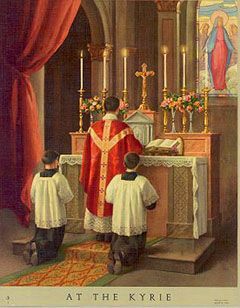
Kyrie eleison (pronounced kee-ree-ay ay-layee-son) is Greek for "Lord have Mercy", and "Christe eleison" is Greek for "Christ have mercy". It is a prayer for redemption which dates to very early Byzantine Greek masses. In the Western (Latin) Church it dates back 16 centuries to the era of Pope Saint Gregory the Great, who was a major influence and instrument of God in the conversion of Europe, and in the development of “chant” and much of our sacred music.
From the middle of the altar the priest says, alternating with the server(s):
| ORDO MISSAE | ORDINARY OF THE MASS |
| P. Kyrie eleison. | P. Lord, have mercy. |
| S. Kyrie eleison. | S. Lord, have mercy. |
| P. Kyrie eleison. | P. Lord, have mercy. |
| S. Christe eleison. | S. Christ, have mercy. |
| P. Christe eleison. | P. Christ, have mercy. |
| S. Christe eleison. | S. Christ, have mercy. |
| P. Kyrie eleison. | P. Lord, have mercy. |
| S. Kyrie eleison. | S. Lord, have mercy. |
| P. Kyrie eleison. | P. Lord, have mercy. |
Traditional Latin Tridentine Mass
Gloria
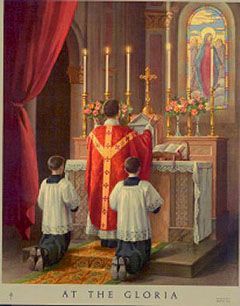
After our plea for mercy "Glory in the Highest" reflects our joy and praise, originating from the song of the angels on the night Jesus was born.
The priest then turns and says in Latin, "The Lord be with you", to which the response is "and with your spirit." This was the ancient way that Christians greeted each other. The Gloria is omitted for penitential seasons, Masses for the dead and certain other Masses.
Standing at the middle of the altar, the priest extends and joins his hands, Makes a slight bow says:
| ORDO MISSAE | ORDINARY OF THE MASS |
| P. Gloria in exceslis Deo. | P. Glory to God in the highest. |
The priest concludes the Gloria below and sits while the choir sings it.
| ORDO MISSAE | ORDINARY OF THE MASS |
| C. Et in terra pax hominibus bonae voluntatis. Laudamus te. Benedicimus te. Adoramus te. Glorificamus te. Gratias agimus tibi propter magnam gloriam tuam. Domine Deus, Rex coelestis, Deus Pater omnipotens. Domine Fili unigenite, Jesu Christe. Domine Deus, Agnus Dei, Filius Patris, Qui tollis peccata mundi, miserere nobis. Qui tollis peccata mundi, suscipe deprecationem nostram. Qui sedes ad dexteram Patris, miserere nobis. Quoniam tu solus Sanctus. Tu solus Dominus. To solus Altissimus, Jesu Christe. Cum Sancto Spiritu in gloria Dei Patris.. Amen. | C. And on earth peace to people of good will. We praise You. We bless You. We worship You. We glorify You. Lord God, heavenly King, God the Father almighty. Lord Jesus Christ, the Only-begotten Son. Lord God, Lamb of God, Son of the Father. You who take away the sins of the world, have mercy on us.. You who take away the sins of the world, receive our prayer. You who sit at the right hand of the Father, have mercy on us. For You alone are holy. You alone are Lord. You alone are the Most High, Jesus Christ, with the Holy Spirit, in the Glory of God the Father. Amen. |
Turning toward the people, the priest says:
| ORDO MISSAE | ORDINARY OF THE MASS |
| P. Dominus Vobiscum. | P. May the Lord be with you. |
| S. Et cum spiritu tuo. | S. And with your Spirit. |
| P. Oremus. | P. Let us pray. |
Traditional Latin Tridentine Mass
Collect
Origination: In the very early days of the Church, Christian worshipers and clergy would form processions that would proceed to various churches where the local people would gather known as the ecclesia collect (church assembly) to conduct mass. At these masses, a community prayer with specific intentions was offered. The Collect is usually a short prayer or series of prayers that vary depending on the day or instruction from the Holy See or a bishop.
Here the priest says the specific Prayers appointed for the day.
Traditional Latin Tridentine Mass
Epistle, Gradual, Tract, Sequence, Gospel, Homily and Credo
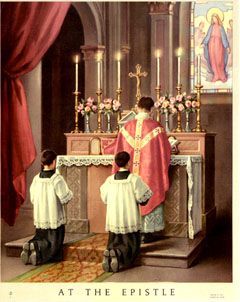
The Epistle or "letter" is usually taken from one of Saint Paul's or another of the letters written by the original twelve apostles to the faithful following the death and resurrection of our Lord. The Epistle and Gospel are first read in Latin at the altar, then more loudly in the vernacular from the pulpit just before the sermon or Homily.
After the Epistle and before the Gospel priest recites the Gradual, Tract, and/or the Sequence for the day if required in the propers for the day's feast. The Gradual is a short prayer or Psalm that relates to the preceding Epistle. The tract is also usually from Psalms and replaces the Alleluja during Lent. The Sequence or "following out" is the last of these short prayers.
We stand and remain standing during the word of our Lord or "Gospel" (from the Anglo Saxon word "godspell"). In early times, an entire book from Matthew, Mark, Luke or John was read or sung entirely. Instead of being read in order, the Gospel readings are now suited to the feast or Mass of that day.
The Nicene Creed was first developed during the Council of Nicea in the year 325 AD. As Catholics, the Credo is our faithful declaration of commitment to the word of God and our church. In early Masses the doors were shut and locked while the Catechumens took this solemn oath before baptism and then again after first communion.
Traditional Latin Tridentine Mass
Epistle
At the Epistle (right) side of the altar, the priest reads the Epistle from the Mass he is celebrating, after which the server says:
| ORDO MISSAE | ORDINARY OF THE MASS |
| S. Deo gratias. | S. Thanks be to God. |
Here the Gradual is sung by the schola, while the preparation for the Gospel occurs (the server moves the Missal from the Epistle (right) side of the altar to the Gospel (left) side of the altar). The Alleluia, and Sequence Paschale victimae in the Easter Vigil, Veni, sancte Spiritus on Pentecost, Lauda Sion on Corpus Christi, Stabat Mater on Our Lady of Sorrows, Dies Irae on All Souls and in requiem and Funeral Masses. In Lent and at Masses for the dead the Alleluia is omitted and a tract sung instead.
Before reading the Gospel, the priest (or the deacon) returns to the center, bows down, joins his hands, and says:
| ORDO MISSAE | ORDINARY OF THE MASS |
| D. Munda cor meum ac labia mea, omnipotens Deus, qui labia Isaiae Prophetae calculo mundasti ignito: ita me tua grata miseratione dignare mundare, ut sanctum Evangelium tuum digne valeam nuntiare. Per Christum Dominum nostrum. Amen. Jube, Domine benedicere. | D. Cleanse my heart and my lips, O Almighty God, Who cleansed the lips of the Prophet Isaiah with a burning coal. In Your gracious mercy deign so to purify me that I may worthily proclaim Your holy Gospel. Through Christ our Lord. Amen. Lord, grant me your blessing. |
| P. Dominus sit in corde meo et in labiis meis. ut digne et competenter annuntiem evangelium suum. | P. The Lord be in your heart and on your lips that you may worthily and fittingly proclaim His holy Gospel. In the name of the Father, and of the Son, + and of the Holy Spirit. |
| D. Amen. | D. Amen. |
Traditional Latin Tridentine Mass
Gospel
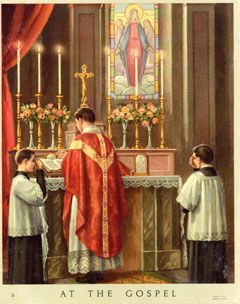
All stand for the Holy Gospel
| ORDO MISSAE | ORDINARY OF THE MASS |
| P/D. Dominus vobiscum. | P/D. May the Lord be with you. |
| S. Et cum spiritu tuo. | S. And with your spirit. |
| P/D. Sequentia (or Initium) sancti Evangelii secundum N. | P/D. + A continuation of the holy Gospel according to St. (name). |
| ORDO MISSAE | ORDINARY OF THE MASS |
| S. Gloria tibi, Domine. | S. Glory to you, O Lord. |
The Holy Gospel is sung or read aloud.
At the end, the deacon or server says:
| ORDO MISSAE | ORDINARY OF THE MASS |
| S. Laus tibi, Christe. | Praise to you, O Christ. |
At high Mass, the deacon takes the Missal to the celebrant, who kisses it and says:
| ORDO MISSAE | ORDINARY OF THE MASS |
| P. Per evangelica dicta deleantur nostra delicta. | P. May the words of the gospel wipe away our sins. |
If lay people are attending, the priest may go to the pulpit and read the Epistle and the Gospel aloud in the vernacular language. All stand again for the reading of the Gospel, because it usually includes the actual spoken words of our Lord Jesus Christ.
Traditional Latin Tridentine Mass Homily
After the Epistle and Gospel, the priest goes to the pulpit to deliver a philosophical or educational part of the mass known as the Homily or sermon. It often relates directly to the Epistle and Gospel and is usually said in the vernacular when lay people are attending. It is required on Sundays and Holy Days of Obligation, but not required on weekdays.
All sit for the Homily or Sermon.
Traditional Latin Tridentine Mass
Credo
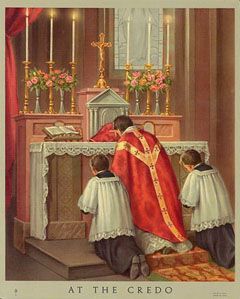
After the Homily, the priest goes to the middle of the altar and begins the Creed. As with the Gloria, he begins the Creed, then is seated while the choir sings it.
| ORDO MISSAE | ORDINARY OF THE MASS |
| C. Credo in unum Deum, Patrem omnipotentem, factorem coeli et terrae, visibilium omnium et invisibilium. Et in unum Dominum Jesum Christum, Filium Dei unigenitum. Et ex Patre natum ante omnia saecula. Deum de Deo, lumen de lumine, Deum verum de Deo vero. Genitum, not factum, consubstantialem Patri: per quem omnia facta sunt. Qui propter nos homines, et propter nostram salutem descendit de coelis. Et incarnatus est de Spiritu Sancto ex Maria Virgine: ET HOMO FACTUS EST. Crucifixus etiam pro nobis; sub Pontio Pilato passus, et sepultus est. Et resurrexit tertia die, secundum Scripturas. Et ascendit in coelum: sedet ad dexteram Patris. Et iterum venturus est cum gloria judicare vivos et mortuos. cujus regni non erit finis. Et in Spiritum Sanctum, Dominum et vivificantem: qui ex Patre Filioque procedit. Qui cum Patre, et Filio simul adoratur et conglorificatur: qui locutus est per Prophetas. Et unam, sanctam, catholicam et apostolicam Ecclesiam. Confiteor unum baptisma in remissionem peccatorum. Et exspecto resurrectionem mortuorum. Et vitam venturi saeculi. Amen. | C. I believe in one God, The Father Almighty, Maker of heaven and earth, and of all things visible and invisible. And in one Lord, Jesus Christ, the Only-begotten Son of God. Born of the Father before all ages. God of God, Light of Light, true God of true God. Begotten, not made, of one substance with the Father. By whom all things were made. Who for us men and for our salvation came down from heaven. (here all present kneel) And became incarnate by the Holy Spirit of the Virgin Mary: AND WAS MADE MAN. (here all arise) He was also crucified for us, suffered under Pontius Pilate, and was buried. And on the third day He rose again according to the Scriptures. He ascended into heaven and sits at the right hand of the Father. He will come again in glory to judge the living and the dead and His kingdom will have no end. And in the Holy Spirit, the Lord and Giver of life, Who proceeds from the Father and the Son. Who together with the Father and the Son is adored and glorified, and who spoke through the prophets. And one holy, Catholic and Apostolic Church. I confess one baptism for the forgiveness of sins and I await the resurrection of the dead and the life + of the world to come. Amen. |
| P. Dominus vobiscum. | P. May the Lord be with you. |
| S. Et cum spiritu tuo. | S. And with your spirit. |
| P. Oremus. | P. Let us pray. |
At this point the Mass of the Catechumens ends, and the Mass of thd Faithful continues. In the ancient Church the Catechumens (those who had not yet received First Communion) were dismissed here.
Traditional Latin Tridentine Mass
Offertory
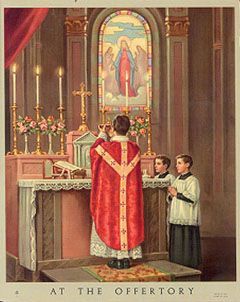
The priest reads the prayer, which makes an offering of the unconsecrated bread and wine (offertory) to God for the Mass. He then asks the Lord to please accept (suscipe) our offering, despite our unworthiness, for all Christians, living and dead.
In the ancient Church, worshipers would proceed to the altar bringing gifts of food, gold and other property.
The unleavened wheaten bread is specially prepared and the wine, red or white, is fermented purely and naturally. It is mixed, with prayer, with a small amount of water as Christ did at the last supper. His blood also came forth mixed with water when He died on the cross. To keep out dust, the chalice is cleaned before and covered after pouring the water and wine into it while reciting a prayer.
Offertory Verse: The Offertory Antiphon is sung while the priest begins the prayers.
Offertory Prayers: Prayers are said in a low voice while the Choir sings the Verse.
All sit.| ORDO MISSAE | ORDINARY OF THE MASS |
| P. Suscipe, sancte Pater, omnipotens aeterne Deus, hanc immaculatam hostiam, quam ego indignus famulus tuus offero tibi, Deo meo vivo et vero, pro innumerabilibus peccatis, et offensionibus, et negligentiis meis, et pro omnibus circumstantibus, sed et pro omnibus fidelibus Christianis vivis atque defunctis. ut mihi, et illis proficiat ad salutem in vitam aeternam. | P. Accept, O Holy Father, Almighty and eternal God, this spotless host, which I, your unworthy servant, offer to You, my living and true God, to atone for my numberless sins, offenses and negligences; on behalf of all here present and likewise for all faithful Christians living and dead, that it may profit me and them as a means of salvation to life everlasting. |
| S.Amen. | S.Amen. |
| P. Deus, qui humanae substantiae dignitatem mirabiliter condidisti, et mirabilius reformasti: da nobis per hujus aquae et vini mysterium, ejus divinitatis esse consortes, qui humanitatis nostrae fieri dignatus est particeps, Jesus Christus Filius tuus Dominus noster: Qui tecum vivit et regnat in unitate Spiritus Sancti Deus. per omnia saecula saeculorum. Amen. | P. O God, + who established the nature of man in wondrous dignity, and still more admirably restored it, grant that by the mystery of this water and wine, may we come to share in His Divinity, who humbled himself to share in our humanity, Jesus Christ, Your Son, our Lord. who lives and reigns with You in the unity of the holy Spirit, one God, forever and ever. Amen. |
| P. Offerimus tibi, Domine, calicem salutaris tuam deprecantes clementiam: ut in conspectu divinae majestatis tuae, pro nostra et totius mundi salute cum odore suavitatis ascendat. Amen. | P. We offer You, O Lord, the chalice of salvation, humbly begging of Your mercy that it may arise before Your divine Majesty, with a pleasing fragrance, for our salvation and for that of the whole world. Amen. |
| P. In spiritu humilitatis, et in animo contrito suscipiamur a te, Domine, et sic fiat sacrificium nostrum in conspectu tuo hodie, ut placeat tibi, Domine Deus. | P. In a humble spirit and with a contrite heart, may we be accepted by You, O Lord, and may our sacrifice so be offered in Your sight this day as to please You, O Lord God. |
| P. Veni, Sanctificator omnipotens aeterne Deus. et benedic hoc sacrificum tuo sancto nomini praeparatum. | P. Come, O Sanctifier, Almighty and Eternal God, and bless, + this sacrifice prepared for the glory of Your holy Name. |
When Mass is sung, the priest blesses Incense, saying:
| ORDO MISSAE | ORDINARY OF THE MASS |
| P. Per intercessionem beati Michaelis Archangeli, stantis a dextris altaris incensi, et omnium electorum suorum, incensum istud dignetur Dominus benedicere, et in odorem suavitatis accipere. Per Christum Dominum nostrum. Amen. | P. Through the intercession of Blessed Michael the Archangel, standing at the right hand of the altar of incense, and of all His elect may the Lord vouchsafe to bless + this incense and to receive it in the odor of sweetness. Through Christ our Lord. Amen. |
The priest censes the offerings, the cross and the altar, saying:
| ORDO MISSAE | ORDINARY OF THE MASS |
| P. Incensum istud a te benedictum, ascendat ad te, Domine, et descendat super nos misericordia tua. | P. May this incense blessed by You, arise before You, O Lord, and may Your mercy come down upon us. |
The priest incenses the altar.
| ORDO MISSAE | ORDINARY OF THE MASS |
| P. Dirigatur, Domine, oratio mea sicut incensum in conspectu tuo: elevatio manuum mearum sacrificium vespertinum. Pone, Domine, custodiam ori meo, et ostium circumstantiae labiis meis : ut non declinet cor meum in verba malitiae, ad excusandas excusationes in peccatis. | P. Let my prayer, O Lord, come like incense before You; the lifting up of my hands, like the evening sacrifice. O Lord, set a watch before my mouth, a guard at the door of my lips. Let not my heart incline to the evil of engaging in deeds of wickedness. |
He hands back the thruible.
| ORDO MISSAE | ORDINARY OF THE MASS |
| P. Accendat in nobis Dominus ignem sui amoris, et flammam aeterne caritatis. Amen. | P. May the Lord enkindle in us the fire of His love and the flame of everlasting charity. Amen. |
At this point, the celebrant, the ministers, the servers, and the people are censed, in that order.
Traditional Latin Tridentine Mass
Lavabo
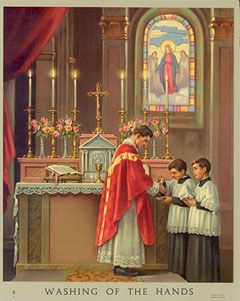
Lava: Latin for for wash (or bathe.) In the ancient church the priest would clean his hands after receiving gifts of oil, food and other goods. In the past it has been symbolic of Pilate washing his hands of Jesus' blood.
The priest then begins to recite Psalm 26 with "I shall wash" while the server pours water from a cruet over his fingers. He then prays the Gloria Patria and moves to the center of the altar and recites the seventh offertory prayer, in which he asks the Holy Trinity to accept our sacrifice in commemoration of our Lord's passion and resurrection and in remembrance of our Blessed Virgin Mother and the saints.
Going to the Epistle (right) side of the altar, the priest washes his fingers and says:
| ORDO MISSAE | ORDINARY OF THE MASS |
| P. Lavabo inter innocentes manus meas. et circumdabo altare tuum, Domine. Ut audiam vocem laudis. et enarrem universa mirabila tua. Domine, dilexi decorem domus tuae: et locum habitationis gloriae tuae. Ne perdas cum impiis, Deus animam meam: et cum viris sanguinum vitam meam: in quorum manibus iniquitates sunt: dextera eorum repleta est muneribus. Ego autem in innocentia mea ingressus sum: redime me, et miserere mei. Pes meus stetit in directo: in ecclesiis benedicam te, Domine. | P. I wash my hands in innocence, and I go around Your altar, O Lord, giving voice to my thanks, and recounting all Your wondrous deeds. O Lord, I love the house in which You dwell, the tenting place of Your glory. Gather not my soul with those of sinners, nor with men of blood my life. On their hands are crimes, and their right hands are full of bribes. But I walk in integrity; redeem me, and have pity on me My foot stands on level ground; in the assemblies I will bless You, O Lord. |
| Gloria Patri, et Filio, et Spiritui Sancto. Sicut erat in principio, et nunc, et semper: et in saecula saeculorum. Amen. | Glory be to the Father, and to the Son, and to the Holy Spirit. As it was in the beginning, is now, and ever shall be, world without end. Amen. |
Facing the middle of the altar the priest continues.
| ORDO MISSAE | ORDINARY OF THE MASS |
| P. Suscipe sancta Trinitas, hanc oblationem, quam tibi offerimus ob memoriam passionis, resurrectionis, et ascensionis Jesu Christi Domini nostri: et in honorem beatae Mariae semper Virginis, et beati Joannis Baptistae, et sanctorum Apostolorum Petri et Pauli, et istorum, et omnium Sanctorum: ut illis proficiat ad honorem, nobis autem ad salutem: et illi pro nobis intercedere dignentur in coelis, quorum memoriam agimus in terris. Per eumdem Christum Dominum nostrum. S. Amen. | P. Accept, most Holy Trinity, this offering which we are making to You in remembrance of the passion, resurrection, and ascension of Jesus Christ, Our Lord; and in honor of blessed Mary, ever Virgin, Blessed John the Baptist, the Holy Apostles Peter and Paul, and of (name of the Saints whose relics are in the Altar) and of all the Saints; that it may add to their honor and aid our salvation; and may they deign to intercede in heaven for us who honor their memory here on earth. Through the same Christ our Lord. |
| S. Amen. | S. Amen. |
The priest kisses the altar, turns to the people and says:
| ORDO MISSAE | ORDINARY OF THE MASS |
| P. Orate fratres, ut meum ac vestrum sacrificium acceptabile fiat apud Deum Patrem omnipotentem. | P. Pray brethren, that my Sacrifice and yours may be acceptable to God the Father Almighty. |
| S. Suscipiat Dominus sacrificium de manibus tuis ad laudem et gloriam nominis sui, ad utilitatem quoque nostram, totiusque Ecclesiae suae sanctae. | S. May the Lord receive the Sacrifice from your hands to the praise and glory of His Name, for our good, and that of all His holy Church. |
Traditional Latin Tridentine Mass
Secret Prayer

With his hands extended, the priest says the Secret prayers.
Preface:
"Per ominia saecula saeculorum" (forever and ever) begins the preface where we give thanks and praise to God. It concludes with The Sanctus, a prayer of union with the heavenly hosts and of adoration of the most "Holy, Holy, Holy" triune God.
Most often the Preface will be The Preface of the Most Holy Trinity (below) unless another is substituted, such as the Preface of the Nativity or the Preface of the Epiphany.
Then the priest now says, in a louder voice:
| ORDO MISSAE | ORDINARY OF THE MASS |
| P: Per omnia saecula saeculorum. | P: World without end. |
| S: Amen. | S: Amen. |
| P: Dominus vobiscum. | P: The Lord be with you. |
| S: Et cum spiritu tuo. | S: And with thy spirit. |
| P: Sursum corda. | P: Lift up your hearts. |
| S: Habemus ad Dominum. | S: We have them lifted up unto the Lord. |
| P: Gratias agamus Domino Deo nostro. | P: Let us give thanks to the Lord our God. |
| S: Dignum et justum est. | S: It is meet and just. |
| P: Vere dignum et justum est, aequum et salutare, nos tibi semper, et ubique gratias agere: Domine sancte, Pater omnipotens, aeterne Deus. Qui cum unigenito Filio tuo, et Spiritu Sancto, unus es Deus, unus es Dominus: non in unius singularitate personae, sed in unius Trinitate substantiae. Quod enim de tua gloria, revelante te, credimus, hoc de Filio tuo, hoc de Spritu sancto, sine differentia discretionis sentimus. Ut in confessione verae, sempiternaeque Deitatis, et in personis proprietas, et in essentia unitas, et in majestate adoretur aequalitas. Quam laudant Angeli, atque Archangeli, Cherubim quoque ac Seraphim: qui non cessant clamare quotidie, una voce dicentes: | P: It is truly meet and just, right and profitable, for us, at all times, and in all places, to give thanks to Thee, O Lord, the holy One, the Father almighty, the everlasting God: Who, together with Thine only-begotten Son and the Holy Ghost, art one God, one Lord, not in the singleness of one Person, but in the Trinity of one substance. For that which, according to Thy revelation, we believe of Thy glory, the same we believe of Thy Son, the same of the Holy Ghost, without difference or distinction; so that in the confession of one true and eternal Godhead we adore distinctness in persons, oneness in essence, and equality in majesty: Which the angels praise, and the archangels, the cherubim also and the seraphim, who cease not, day by day crying out with one voice to repeat: |
Here the bell is rung three times.
| ORDO MISSAE | ORDINARY OF THE MASS |
| P: Sanctus, Sanctus, Sanctus, Dominus Deus Sabaoth. Pleni sunt coeli et terra gloria tua. Hosanna in excelsis. Benedictus qui venit in nomine Domini. Hosanna in excelsis. | P: Holy, holy, holy, Lord God of hosts. The heavens and the earth are full of Thy glory. Hosanna in the highest. Blessed is He Who cometh in the name of the Lord. Hosanna in the highest. |
Traditional Latin Tridentine Mass
Canon Of The Mass
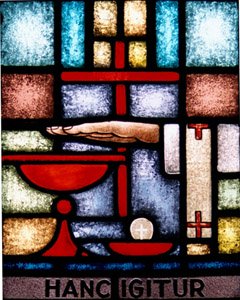
Canon translates to "measuring stick" in Greek. It starts with the three remembrances: first, for the church in which we ask God to accept and bless our gifts through His Son Jesus Christ; second, for the living, in which we pray for for protection and peace in His Church; third, offering up to to God those offering the Mass, including all those present, the angels and saints, and our Blessed Mother.
The priest then begins the offering prayer (Hanc Igitur) of the Mass while holding his hands over the chalice with his thumbs overlapped in a cross, representing the sins of the world that Christ took upon Himself. In times before the new and everlasting covenant, a similar gesture was made over the Lambs and other victims of sacrifice at the altar of God.
The priest prays silently:
| ORDO MISSAE | ORDINARY OF THE MASS |
| P: Te igitur clementissime Pater, per Jesum Christum Filium tuum Dominum nostrum, supplices rogamus ac petimus, uti accepta habeas, et benedicas haec `†´ dona, haec `†´ munera, haec `†´ sancta sacrificia illibata, in primis quae tibi offerimus pro Ecclesia tua sancta Catholica; quam pacificare, custodire, adunare, et regere digneris toto orbe terrarum: una cum famulo tuo Papa nostro "N." et Antistite nostro "N." et omnibus orthodoxis, atque Catholicae et Apostolicae fidei cultoribus. | P: Therefore, we humbly pray and beseech Thee, most merciful Father, through Jesus Christ Thy Son, Our Lord, to receive and to bless these `†´ gifts, these `†´ presents, these `†´ holy unspotted sacrifices, which we offer up to Thee, in the first place, for Thy holy Catholic Church, that it may please Thee to grant her peace, to guard, unite, and guide her, throughout the world: as also for Thy servant N., our Pope, and N., our Bishop, and for all who are orthodox in belief and who profess the Catholic and apostolic faith. |
Commemoration of the Living
| ORDO MISSAE | ORDINARY OF THE MASS |
| P: Memento Domine famulorum, famularumque tuarum "N." et "N." et omnium circumstantium, quorum tibi fides cognita est, et nota devotio, pro quibus tibi offerimus: vel qui tibi offerunt hoc sacrificium laudis pro se, suisque omnibus: pro redemptione animarum suarum, pro spe salutis et incolumitatis suae: tibique reddunt vota sua aeterno Deo vivo et vero. | P: Be mindful, O Lord, of Thy servants, N. and N., and of all here present, whose faith and devotion are known to Thee, for whom we offer, or who offer up to Thee, this sacrifice of praise, for themselves, their families, and their friends, for the salvation of their souls and the health and welfare they hope for, and who now pay their vows to Thee, God eternal, living, and true. |
The Communicantes
| ORDO MISSAE | ORDINARY OF THE MASS |
| P: Communicantes, et memoriam venerantes, in primis gloriosae semper virginis Mariae genitricis Dei et Domini nostri Jesu Christi: sed {et beati Joseph, ejusdem virginis sponsi} et beatorum Apostolorum ac martyrum tuorum, Petri et Pauli, Andreae, Jacobi, Joannis, Thomae, Jacobi, Philippi, Bartholomaei, Matthaei, Simonis et Thaddaei: Lini, Cleti, Clementis, Xysti, Cornelii, Cypriani, Laurentii, Chrysogoni, Joannis et Pauli, Cosmae et Damiani, et omnium sanctorum tuorum: quorum meritis precibusque concedas, ut in omnibus protectionis tuae muniamur auxilio. Per eumdem Christum Dominum nostrum. Amen. | P: Having communion with and venerating the memory, first, of the glorious Mary, ever a virgin, mother of Jesus Christ, our God and our Lord: likewise {of blessed Joseph, spouse of the same virgin} of Thy blessed apostles and martyrs, Peter and Paul, Andrew, James, John, Thomas, James, Phillip, Bartholomew, Matthew, Simon and Thaddeus; of Linus, Cletus, Clement, Sixtus, Cornelius, Cyprian, Lawrence, Chrysogonus, John and Paul, Cosmas and Damian, and of all Thy saints: for the sake of whose merits and prayers do Thou grant that in all things we may be defended by the help of Thy protection. Through the same Christ, our Lord. Amen. |
The Hanc Igitur
| ORDO MISSAE | ORDINARY OF THE MASS |
| P: Hanc igitur oblationem servitutis nostrae, sed et cunctae familiae tuae, quaesumus, Domine, ut placatus accipias: diesque nostros in tua pace disponas, atque ab aeterna damnatione nos eripi, et in electorum tuorum jubeas grege numerari. Per Christum Dominum nostrum. Amen. | P: Wherefore, we beseech Thee, O Lord, graciously to receive this oblation which we Thy servants, and with us Thy whole family, offer up to Thee: dispose our days in Thy peace; command that we be saved from eternal damnation and numbered among the flock of Thine elect. Through Christ our Lord. Amen. |
Quam Oblationem
| ORDO MISSAE | ORDINARY OF THE MASS |
| P: Quam oblationem tu, Deus, in omnibus, quaesumus benedictam `†´, adscriptam `†´, ratam `†´, rationabilem, acceptabilemque facere digneris: ut nobis Corpus `†´, et Sanguis `†´ fiat dilectissimi Filii tui Domini nostri Jesu Christi. | P: And do Thou, O God, vouchsafe in all respects to bless `†´, consecrate `†´, and approve `†´ this our oblation, to perfect it and render it well-pleasing to Thyself, so that it may become for us the body `†´ and blood `†´ of Thy most beloved Son, Jesus Christ our Lord. |
Traditional Latin Tridentine Mass
Consecration Of The Host

The priest repeats the what our Lord told us during the last supper on the night before he suffered and died. At the moment the words "took bread" are spoken, he takes the host into his hands and makes the sign of the cross as he says " blessed it".
| ORDO MISSAE | ORDINARY OF THE MASS |
| P: Qui pridie quam pateretur, accepit panem in sanctas ac venerabiles manus suas: et elevatis oculis in coelum ad te Deum Patrem suum omnipotentem, tibi gratias agens, benedixit `†´, fregit, deditque discipulis suis, dicens: Accipite et manducate ex hoc omnes: | P: Who, the day before He suffered, took bread into His holy and venerable hands, and having lifted up His eyes to heaven, to Thee, God, His almighty Father, giving thanks to Thee, blessed it `†´, broke it, and gave it to His disciples, saying: Take ye and eat ye all of this: |
The priest then bends over the Host and, standing in persona Christi, makes this most solemn pronouncement:
| ORDO MISSAE | ORDINARY OF THE MASS |
| HOC EST ENIM CORPUS MEUM. | FOR THIS IS MY BODY. |
Then the priest adores and elevates the now Sacred Host High enough for everyone to see, and the bell is rung.
Traditional Latin Tridentine Mass
Consecration Of The Wine
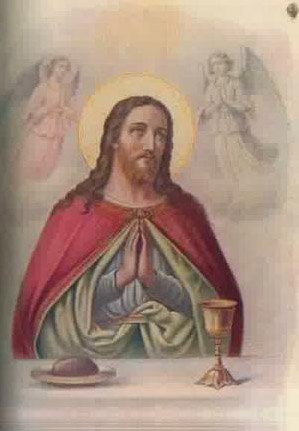
The priest then uncovers the Chalice and says:
| ORDO MISSAE | ORDINARY OF THE MASS |
| P: Simili modo postquam coenatum est, accipiens et hunc praeclarum Calicem in sanctas ac venerabiles manus suas: item tibi gratias agens, benedixit `†´, deditque discipulis suis, dicens: Accipite et bibite ex eo omnes: | P: In like manner, after He had supped, taking also into His holy and venerable hands this goodly chalice again giving thanks to Thee, He blessed it `†´, and gave it to His disciples, saying: Take ye, and drink ye all of this: |
The priest then bends over the Chalice and, standing in persona Christi, makes this most solemn pronouncement:
| ORDO MISSAE | ORDINARY OF THE MASS |
| HIC EST ENIM CALIX SANGUINIS MEI, NOVI ET AETERNI TESTAMENTI: MYSTERIUM FIDEI, QUI PRO VOBIS ET PRO MULTIS EFFENDETUR IN REMISSIONEM PECCATORUM. | FOR THIS IS THE CHALICE OF MY BLOOD, OF THE NEW AND EVERLASTING TESTAMENT, THE MYSTERY OF FAITH, WHICH FOR YOU AND FOR MANY SHALL BE SHED UNTO THE REMISSION OF SINS. |
| P: Haec quotiescumque feceritis in mei memoriam facietis. | P: As often as ye shall do these things, ye shall do them in memory of Me. |
The priest then adores and elevates the now Sacred Cup high enough for everyone to see, and the bell is rung.
Salvation History Recalled

In the following prayer, Christ's Passion is called to mind as well as his Resurrection and Ascension. Then follows a prayer asking that God accept our sacrifice as he did in pre-Christian times for Abel, Abraham and Melchisedech. Their sacrifices were pleasing to the Lord for various reasons. Abel because he offered himself as a good servant, Abraham because he was willing to give what was most dear to him and Melchisedech because his was given with thanks. The word "Eucharist" is Greek for "thanksgiving". Also called to remembrance are our martyrs, sinners and the dead.
The priest continues:
| ORDO MISSAE | ORDINARY OF THE MASS |
| P: Unde et memores Domine, nos servi tui, sed et plebs tua sancta, ejusdem Christi Filii tui Domini nostri tam beatae passionis, nec non et ab inferis resurrectionis, sed et in coelos gloriosae ascensionis: offerimus praeclarae majestati tuae de uis donis ac datis, hostiam `†´ puram, hostiam `†´ sanctam, hostiam `†´ immaculatam, Panem `†´ sanctum vitae aeternae, et Calicem `†´ salutis perpetuae. | P: Wherefore, O Lord, we, Thy servants, as also Thy holy people, calling to mind the blessed passion of the same Christ, Thy Son, our Lord, His resurrection from the grave, and His glorious ascension into heaven, offer up to Thy most excellent majesty of Thine own gifts bestowed upon us, a victim `†´ which is pure, a victim `†´ which is stainless, the holy bread `†´ of life everlasting, and the chalice `†´ of eternal salvation. |
| P: Supra quae propitio ac sereno vultu respicere digneris: et accepta habere, sicuti accepta habere dignatus es munera pueri tui justi Abel, et sacrificium patriarchae nostri Abraham: et quod tibi obtulit summus sacerdos tuus Melchisedech, sanctum sacrificium, immaculatam hostiam. | P: Vouchsafe to look upon them with a gracious and tranquil contenance, and to accept them, even as Thou wast pleased to accept the offerings of Thy just servant Abel, and the sacrifice of Abraham, our patriarch, and that which Melchisedech, Thy high priest, offered up to Thee, a holy sacrifice, a victim without blemish. |
| P: Supplices te rogamus, omnipotens Deus; jube haec perferri per manus sancti Angeli tui in sublime altare tuum, in conspectu divinae majestatis tuae: ut quotquot ex hac altaris participatione, sacrosanctum Filii tui Corpus `†´ et Sanquinem `†´ sumpserimus omni benedictione coelesti et gratia repleamur. Per eumdem Christum Dominum nostrum. Amen. | P: We humbly beseech Thee, almighty God, to command that these our offerings be borne by the hands of Thy holy angel to Thine altar on high in the presence of Thy divine Majesty; that as many of us as shall receive the most sacred `†´ Body and `†´ Blood of Thy Son by partaking thereof from this altar may be filled with every heavenly blessing and grace: Through the same Christ our Lord. Amen. |
Commemoration of the dead
| ORDO MISSAE | ORDINARY OF THE MASS |
| P: Memento etiam, Domine, famulorum famularumque tuarum "N." et "N." qui nos praecesserunt cum signo fidei, et dormiunt in somno pacis. | P: Be mindful, also, O Lord, of Thy servants N. and N., who have gone before us with the sign of faith and who sleep the sleep of peace. |
| P: Ipsis Domine, et omnibus in Christo quiescentibus, locum refrigerii, lucis et pacis, ut indulgeas, deprecamur, per eumdem Christum Dominum nostrum. Amen. | P: To these, O Lord, and to all who rest in Christ, grant, we beseech Thee, a place of refreshment, light, and peace. Through the same Christ our Lord. Amen. |
The priest strikes his breast, saying:
| ORDO MISSAE | ORDINARY OF THE MASS |
| P: Nobis quoque peccatoribus famulis tuis, de multitudine miserationum tuarum sperantibus, partem aliquam et societatem donare digneris, cum tuis sanctis Apostolis et Martyribus: cum Joanne, Stephano, Matthia, Barnaba, Ignatio, Alexandro, Marcellino, Petro, Felicitate, Perpetua, Agatha, Lucia, Agnete, Caecilia, Anastasia, et omnibus sanctis tuis: intra quorum nos consortium, non aestimator meriti, sed veniae, quaesumus, largitor admitte. Per Christum Dominum nostrum. | P: To us sinners, also, Thy servants, who put our trust in the multitude of Thy mercies, vouchsafe to grant some part and fellowship with Thy holy apostles and martyrs; with John, Stephen, Matthias, Barnabas, Ignatius, Alexander, Marcellinus, Peter, Felicitas, Perpetua, Agatha, Lucy, Agnes, Cecilia, Anastasia, and with all Thy saints. Into their company do Thou, we beseech Thee, admit us, not weighing our merits, but freely pardoning our offenses: through Christ our Lord. |
| P: Per quem haec omnia, Domine, semper bona creas, sanctificas `†´, vivificas `†´, benedicis `†´ et praestas nobis. | P: By Whom, O Lord, Thou dost always create, sanctify `†´, quicken `†´, bless `†´, and bestow upon us all these good things. |
| P: Per ipsum `†´, et cum ipso `†´, et in ipso `†´, est tibi Deo Patri `†´ omnipotenti, in unitate tus `†´ Sancti, omnis honor et gloria. | P: Through Him `†´, and with Him `†´, and in Him `†´, is to Thee, god the Father `†´ almighty, in the unity of the Holy `†´ Ghost, all honor and glory. |
The priest then raises his voice and says:
| ORDO MISSAE | ORDINARY OF THE MASS |
| P: Per omnia saecula saeculorum. Amen. | P: World without end. Amen. |
The Pater Noster
The "Our Father" is the prayer of the faithful which our Lord Jesus Christ taught His Apostles when they asked Him how they should pray. The priest follows it with a prayer for our deliverance and protection.
| ORDO MISSAE | ORDINARY OF THE MASS |
| P: Oremus. Praeceptis salutaribus moniti, et divina institutione formati, audemus dicere: | P: Let us pray. Admonished by salutary precepts, and following divine directions, we presume to say: |
| P: Pater noster, qui es in coelis: sanctificetur nomen tuum: adveniat regnum tuum: fiat voluntas tua sicut in coelo et in terra. Panem nostrum quotidianum da nobis hodie: et dimitte nobis debita nostra, sicut et nos dimittimus debitoribus nostris. Et ne nos inducas in tentationem. Sed libera nos a malo. Amen. | P: Our Father, Who art in heaven, hallowed be Thy name; Thy kingdom come; Thy will be done on earth as it is in heaven; give us this day our daily bread; and forgive us our trespasses, as we forgive those who trespass against us, and lead us not into temptation. But deliver us from evil. Amen. |
| P: Libera nos, quaesumus Domine, ab omnibus malis praeteritis, praesentibus, et futuris: et intercedente beata et gloriosa semper Virgine Dei Genitrice Maria, cum beatis Apostolis tuis Petro at Paulo, atque Andrea, et omnibus sanctis, da propitius pacem in diebus nostris: ut ope misericordiae tuae adjuti, et a peccato simus semper liberi, et ab omni perturbatione securi. | P: Deliver us, we beseech Thee, O Lord, from all evils, past, present, and to come: and by the intercession of the blessed and glorious Mary, ever a virgin, Mother of God, and of Thy holy apostles Peter and Paul, of Andrew, and of all the saints, graciously grant peace in our days, that through the help of Thy bountiful mercy we may always be free from sin and secure from all disturbance. |
Traditional Latin Tridentine Mass
Breaking of the Bread (Fracto Panis)
Breaking of the Bread (Fracto Panis)

The priest breaks the consecrated Sacred Host, saying:
| ORDO MISSAE | ORDINARY OF THE MASS |
| P: Per eumdem Dominum nostrum Jesum Christum Filium tuum. Qui tecum vivit et regnat in unitate Spiritus Sancti Deus. Per omnia saecula saeculorum. | P: Through the same Jesus Christ, Thy Son, our Lord, Who liveth and reigneth with Thee in the unity of the Holy Ghost, God, World without end. |
| S: Amen. | S: Amen. |
| P: Pax `†´ Domini sit `†´ semper vobiscum `†´. | P: May the peace `†´ of the Lord `†´ be always with `†´ you. |
| S: Et cum spiritu tuo. | S: And with thy spirit. |
The priest then drops a particle of the Sacred Host into the Chalice.
| ORDO MISSAE | ORDINARY OF THE MASS |
| P: Haec commixtio et consecratio Corporis at Sanguinis Domini nostri Jesu Christi fiat accipientibus nobis in vitam aeternam. Amen. | P: May this commingling and consecrating of the Body and Blood of Our Lord Jesus Christ avail us who receive it unto life everlasting. Amen. |
Traditional Latin Tridentine Mass
Lamb Of God (Agnus Dei)
Throughout both Testaments of the Bible our Lord is referred to in prophecy and in fact as the "Lamb of God". Before the New and Everlasting Covenant, lambs were used for sacrificial offerings. As humans would sacrifice lambs, God Himself graciously gave us His only Son as a sacrifice for our redemption.
Three prayers follow the Agnus Dei, preceeding the Communion prayer, which is based on the Roman centurion's plea for Christ to heal his ill servant.
Bowing down, the priest says:
| ORDO MISSAE | ORDINARY OF THE MASS |
| P: Agnus Dei, qui tollis peccata mundi, miserere nobis. Agnus Dei, qui tollis peccata mundi, miserere nobis. Agnus Dei, qui tollis peccata mundi, dona nobis pacem. | P: Lamb of God, Who takest away the sins of the world: have mercy on us. Lamb of God, Who takest away the sins of the world: have mercy on us. Lamb of God, Who takest away the sins of the world: grant us peace. |
| P: Domine Jesu Christe, qui dixisti Apostolis tuis: pacem relinquo vobis, pacem meam do vobis: ne respicias peccata mea, sed fidem Ecclesiae tuae; eamque secundum voluntatem tuam pacificare et coadunare digneris. Qui vivis et regnas Deus, per omnia saecula saeculorum. Amen. | P: O Lord Jesus Christ Who didst say to Thine apostles: Peace I leave you, My peace I give you: look not uon my sins, but upon the faith of Thy Church, and vouchsafe to grant her peace and unity according to Thy will: Who livest and reignest God, world without end. Amen. |
| P: Domine Jesu Christe, Fili Dei vivi, qui ex voluntate Patris cooperante Spritu Sancto, per mortem tuam mundum vivificasti: libera me per hoc sacrosanctum Corpus et Sanguinem tuum ab omnibus iniquitatibus meis et universis malis: et fac me tuis semper inhaerere mandatis: et a te nunquam separari permittas: qui cum eodem Deo Patre et Spiritu Sancto vivis et regnas Deus in saecula saeculorum. Amen. | P: O Lord Jesus Christ, Son of the living God, Who, according to the will of the Father, through the co-operation of the Holy Ghost, hast by Thy death given life to the world: deliver me by this Thy most Sacred Body and Blood from all my iniquities, and from every evil; make me always cleave to Thy commandments, and never suffer me to be separated from Thee, Who with the same God, the Father and the Holy Ghost, livest and reignest God, world without end. Amen. |
| P: Perceptio Corporis tui, Domine Jesu Christe, quod ego indignus sumere praesumo, non mihi proveniat in judicium et condemnationem: sed pro tua pietate prosit mihi ad tutamentum mentis et corporis, et ad medelam percipiendam. Qui vivis et regnas cum Deo Patre in unitate Spiritus Sancti Deus, per omnia saecula saeculorum. Amen. | P: Let not the partaking of Thy Body, O Lord Jesus Christ, which I, all unworthy, presume to receive, turn to my judgement and condemnation; but through Thy loving kindness may it be to me a safeguard and remedy for soul and body; Who, with God the Father, in the unity of the Holy Ghost, livest and reignest, God, world without end. Amen. |
Traditional Latin Tridentine Mass
The Communion
The priest genuflects, rises and says:
| ORDO MISSAE | ORDINARY OF THE MASS |
| P: Panem coelestem accipiam et nomen Domini invocabo. | P: I will take the bread of heaven, and will call upon the name of the Lord. |
Taking the Sacred Host with his left hand, the priest repeats this prayer three times, strikes his breast each of the three times, and the bell is rung each of the three times.
| ORDO MISSAE | ORDINARY OF THE MASS |
| P: Domine, non sum dignus ut intres sub tectum meum: sed tantum dic verbo, et sanabitur anima mea (three times). | P: Lord, I am not worthy that Thou shouldst enter under my roof; but only say the word, and my soul shall be healed. (three times) |
Traditional Latin Tridentine Mass
Communion of the Faithful

The consecrated bread and wine are now in substance the body, blood, soul and divinity of our Lord Jesus Christ. The priest has placed a small piece of the consecrated Host into the Chalice and prayed that those who receive it may have eternal life.
He recited the Agnus Dei which - as prophesized from the Old Testament to Revelations - signifies Jesus Christ our only Redeemer as being the sacrificial lamb of God. Then he repeated the prayer of the Roman centurion who wanted to show his faith that Christ could heal his sick servant.
As the priest places a Host directly from the paten into the mouth of each communicant, he prays for life everlasting.
To continue -
Holding the Sacred Host in his right hand, the priest makes the sign of the cross with it and says:
| ORDO MISSAE | ORDINARY OF THE MASS |
| P: Corpus Domini nostri Jesu Christi custodiat animam meam in vitam aeternam. Amen. | P: May the Body of Our Lord Jesus Christ keep my soul unto life everlasting. Amen. |
The priest himself then receives Holy Communion and after a brief meditation continues:
| ORDO MISSAE | ORDINARY OF THE MASS |
| P: Quid retribuam Domino pro omnibus quae retribuit mihi? Calicem salutaris accipiam, et nomen Domini invocabo Dominum, et ab inimicis meis salvus ero. | P: What shall I render unto the Lord for all the things that He hath rendered unto me? I will take the chalice of salvation and will call upon the name of the Lord. With high praises will I call upon the Lord, and I shall be saved from all mine enemies. |
The priest takes the Chalice in his right hand and makes the sign of the cross, saying:
| ORDO MISSAE | ORDINARY OF THE MASS |
| P: Sanguis Domini nostri Jesu Christi custodiat animam meam in vitam aeternam. Amen. | P: May the Blood of Our Lord Jesus Christ keep my soul unto life everlasting. Amen. |
The priest himself then drinks of the cup, and after a brief meditation continues:
Here the server recites the Confiteor in the name of the communicants, and the priest responds with the Misereatur and the Indulgentiam.
The priest faces the people holding the Ciborium and, holding up one of the Sacred Particles before all of the communicants, says:
| ORDO MISSAE | ORDINARY OF THE MASS |
| P: Ecce Agnus Dei, ecce Qui tollit peccata mundi. | P: Behold the Lamb of God, behold Him who taketh away the sins of the world. |
| R: Domine, non sum dignus, ut intres sub tectum meum: sed tantum dic verbo, et sanabitur anima mea. (Repeated three times.) | R: Lord, I am not worthy that Thou shouldst enter under my roof; but only say the word, and my soul shall be healed. (Repeated three times.) |
Here the lay communicants come forward to the Communion rail to receive our Lord in the Sacrament of Holy Communion.
Communion of the Faithful
The priest gives Holy Communion to each communicant saying:
| ORDO MISSAE | ORDINARY OF THE MASS |
| P: Corpus Domini nostri Jesu Christi custodiat animam tuam in vitam aeternam. | P: May the Body of Our Lord Jesus Christ keep your soul unto life everlasting. |
| R: Amen. | R: Amen. |
When all have received Communion, the priest returns to the altar and replaces the Ciborium in the tabernacle. He then receives wine in the Chalice and says:
| ORDO MISSAE | ORDINARY OF THE MASS |
| P: Quod ore sumpsimus Domine, pura mente capiamus: et de munere temporali fiat nobis remedium sempiternum. | P: Into a pure heart, O Lord, may we receive the heavenly food which has passed our lips; bestowed upon us in time, may it be the healing of our souls for eternity. |
The priest then goes to the Epistle (right) side of the Alar, and, while as the server pours wine and water over his fingers, he says:
| ORDO MISSAE | ORDINARY OF THE MASS |
| P: Corpus tuum, Domine, quod sumpsi, et Sanguis, quem potavi, adhaereat visceribus meis: et praesta, ut in me non remaneat scelerum macula, quem pura et sancta refecerunt sacramenta. Qui vivis et regnas in saecula saeculorum. Amen. | P: May Thy Body, O Lord, which I have received, and Thy Blood which I have drunk cleave to mine inmost parts: and do Thou grant that no stain of sin remain in me, whom pure and holy mysteries have refreshed: Who livest and reignest world without end. Amen. |
The Communion Prayer
| ORDO MISSAE | ORDINARY OF THE MASS |
| P: Dominus vobiscum. | P: May the Lord be with you. |
| S: Et cum spiritu tuo. | S: And with thy spirit. |
At the Epistle side, the priest recites the Communion Prayer appropriate for the Mass being celebrated.
The Post-Communion
from the Epistle (right) side of the altar, the priest recites the appropriate Post-communion prayer for the Mass being celebrated.
The post communion prayers change from day to day as do the communion prayers. The Latin derivation of the phrase "Ite missa est" denotes that we are sent on our mission to spread the Gospel, as Christ instructed His apostles before the ascension.
The priest returns to the center, kisses the altar, turns toward the people says:
| ORDO MISSAE | ORDINARY OF THE MASS |
| P: Dominus vobiscum. | P: The Lord be with you. |
| S: Et cum spiritu tuo. | S: And with thy spirit. |
| P: Ite, missa est. | P: Go, the mass is ended. |
| S: Deo gratias. | S: Thanks be to God. |
The priest bows over the altar and recites the following prayer which is known as the "Placeat", which summarizes the intention of the entire mass.
| ORDO MISSAE | ORDINARY OF THE MASS |
| P: Placeat tibi sancta Trinitas, obsequium servitutis meae; et praesta, ut sacrificium, quod oculis tuae majestatis indignus obtuli, tibi sit acceptabile, mihique et omnibus, pro quibus illud obtuli, sit, te miserante, propitiabile. Per Christum Dominum nostrum. Amen. | P: May the lowly homage of my service be pleasing to Thee, O most holy Trinity: and do Thou grant that the sacrifice which I, all unworthy, have offered up in the sight of Thy majesty, may be acceptable to Thee, and, because of Thy loving kindness, may avail to atone to Thee for myself and for all those for whom I have offered it up. Through Christ our Lord. Amen. |
Traditional Latin Tridentine Mass
The Blessing
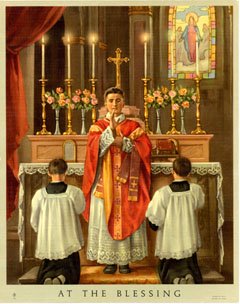
The priest kisses the altar, and at the word "Pater", turns toward the people, blesses them, saying:
| ORDO MISSAE | ORDINARY OF THE MASS |
| P: Benedicat vos omnipotens Deus, Pater, et Filius `†´, et Spiritus Sanctus. | P: May almighty God, the Father, and the Son `†´, and the Holy Ghost, bless you. |
| S: Amen. | S: Amen. |
Traditional Latin Tridentine Mass
The Last Gospel
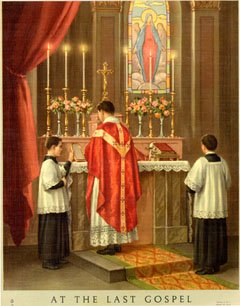
Now said in full at the altar, the Last Gospel was once a private prayer the priest would recite to himself as he went from the altar to the sacristy. Although most priests know it by heart, there is always a large card with the full text in its place on the altar.
During certain feasts, there may be a special Last Gospel but usually it will be the first fourteen verses from the Gospel of Saint John.
The priest now goes to the Gospel (left) side of the altar; he makes the sign of the cross, first upon the altar, and then upon his forehead, lips, and heart, and then he reads the Last Gospel:
| ORDO MISSAE | ORDINARY OF THE MASS |
| P: Dominus vobiscum. | P: The Lord be with you. |
| S: Et cum spiritu tue. | S: And with thy spirit. |
| P: Initium sancti Evangelii secundum Joannem. | P: The beginning of the holy Gospel, according to St. John. |
| P: In prinicipio erat Verbum, et Verbum erat apud Deum, et Deus erat Verbum. Hoc erat in principio apud Deum. Omnia per ipsum facta sunt, et sine ipso factum est nihil quod factum est. In ipso vita erat, et vita erat lux hominum: et lux in tenebris lucet, et tenebrae eam non comprehenderunt. Fuit homo missus a Deo, cui nomen erat Joannes. Hic venit in testimonium, ut testimonium perhiberet de lumine, ut omnes crederent per illum. Non erat ille lux, sed ut testimonium perhiberet de lumine. Erat lux vera quae illuminat omnem hominem venientem in hunc mundum. In mundo erat, et mundus per ipsum factus est, et mundus eum non cognovit. In propria venit, et sui eum non receperunt. Quotquot autem receperunt eum, dedit eis potestatem filios Dei fieri, his qui credunt in nomine ejus. Qui non ex sanguinibus, neque ex voluntate carnis, neque ex voluntate viri, sed ex Deo nati sunt. (Here all genuflect) ET VERBUM CARO FACTUM EST, et habitavit in nobis et vidimus gloriam ejus, gloriam quasi unigeniti a Patre, plenum gratiae et veritatis. | P: In the beginning was the Word, and the Word was with God, and the Word was God. The same was in the beginning with God. All things were made by Him, and without Him was made nothing that was made. In Him was life, and the life was the light of men: and the light shineth in darkness, and the darkness did not comprehend it. There was a man sent from God, whose name was John. This man came for a witness to give testimony of the light, that all men might believe through him. He was not the light, but was to give testimony of the light. That was the true light which enlighteneth every man that cometh into this world. He was in the world, and the world was made by Him, and the world knew Him not. He came unto His own, and His own received Him not. But as many as received Him, to them He gave great power to become the sons of God: to them that believe in His name: who are born, not of blood, nor of the will of the flesh, nor of the will of man, but of God. And (Here all genuflect) THE WORD WAS MADE FLESH, AND DWELT AMONG US, and we saw His glory, the glory as of the only begotten of the Father, full of grace and truth. |
| S: Deo gratias. | S: Thanks be to God. |